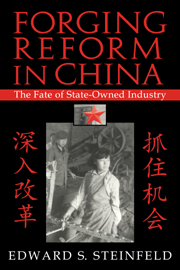Book contents
- Frontmatter
- Contents
- List of Tables and Figures
- Preface
- 1 Introduction: China's Ailing State Enterprises
- Part I Conceptual Approaches to Postsocialist Enterprise Reform
- Part II Enterprise Case Studies: The Commanding Heights in Transition
- Part III Reassessing Chinese Patterns of Economic Development
- Notes
- Bibliography
- Index
1 - Introduction: China's Ailing State Enterprises
Published online by Cambridge University Press: 12 January 2010
- Frontmatter
- Contents
- List of Tables and Figures
- Preface
- 1 Introduction: China's Ailing State Enterprises
- Part I Conceptual Approaches to Postsocialist Enterprise Reform
- Part II Enterprise Case Studies: The Commanding Heights in Transition
- Part III Reassessing Chinese Patterns of Economic Development
- Notes
- Bibliography
- Index
Summary
CHINA'S economic awakening will undoubtedly go down as one of the great events of the twentieth century. In the course of just two decades, the country has undergone processes of social, economic, and industrial change that in the West spanned centuries. On so many fronts today, China is a country and society in revolution: an industrial revolution as hundreds of millions of peasants leave the land for factories, a social revolution as a primarily rural populace urbanizes, and an economic revolution as a self-proclaimed socialist nation negotiates its way from command planning to the market. China in so many ways is engaged in processes for which there is simply no historical precedent. While the nation's entire system of economic organization – an inheritance from twentieth-century Soviet Russia – transforms into another arguably twentieth-century creation, the market capitalism of the West, Chinese society simultaneously lurches through a phase of industrialization on par with that of eighteenth-century England and a wave of urbanization comparable with that of post-Medieval Europe. It is no wonder that this fusion of processes, at once intensely modern and anachronistically ancient, produces outcomes anticipated by not even the wisest of observers and participants. These are incredible times in China – times of euphoria, dislocation, and, beyond all else, uncertainty.
As China's phenomenal growth rates since the early 1980s suggest, many things are clearly going right. Between 1978 and 1996, the country grew at an average annual rate of 9.9 percent, a level impressive by any standard.
Information
- Type
- Chapter
- Information
- Forging Reform in ChinaThe Fate of State-Owned Industry, pp. 1 - 24Publisher: Cambridge University PressPrint publication year: 1998
